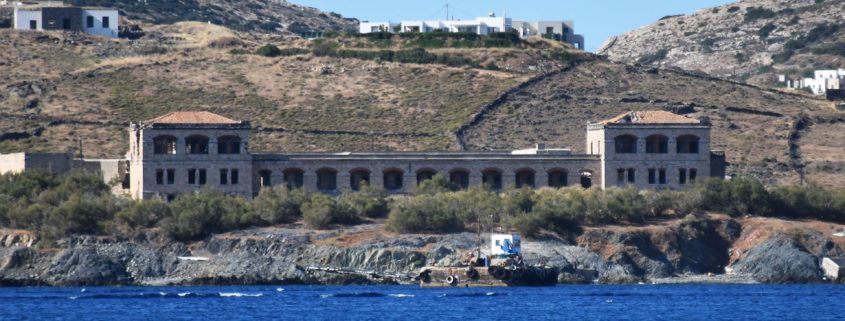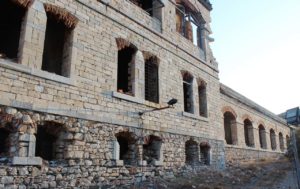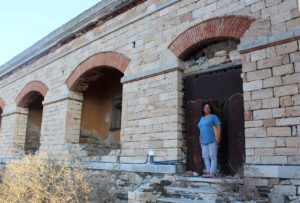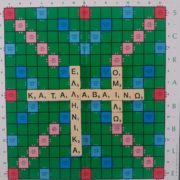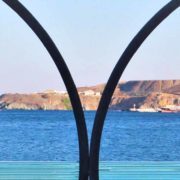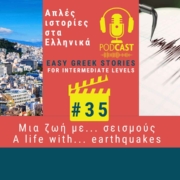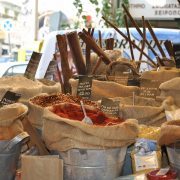Who could imagine in March 2020, that the whole world would go to “lockdown” due to the Corona Covid-19 virus, and when traveling many times a “quarantine” is requested? All this belonged to history, most of us thought… or the younger generation probably never heard of the word “quarantine” before. S0 let’s see how the quarantine was organized on the Greek island of Syros, in the previous century.
Since 2005, during the summer months, Omilo is organizing its Greek Language and Culture courses on the island of Syros. The Omilo students usually fly to Athens or Mykonos, and from there travel by boat to Hermoupolis, the harbor of Syros island, and the capital of all Cycladic islands.
When you are about to arrive and face the harbor, you have a magnificent view over the hills of Hermoupolis and Ano Syros. When you look to the left, on the southern extremity of the port, you also see a stone building, which once was the island’s quarantine, the “Lazaretto”. Nowadays, the building is beautifully lit at night, so it is easy to spot.
The Lazaretto had been built between 1839 and 1841 and back then travelers coming by from Turkey or Egypt stayed for about a week in the lazaretto, to avoid the possibility of contagious disease transmission, like the plague.
As you can imagine, there are plenty of things to say about this interesting building and its different purposes throughout history.
The architect who built the lazaretto was King Otto’s Bavarian engineer, Wilhelm von Weiler. It had 32 “studios” with a fireplace and a separate kitchen and bathroom for travelers as well as galleys and offices for the administrative staff.
It operated from 1840 until 1961. However, in those 120 turbulent years of Greek history, the building was used for different needs: as a quarantine, as a refuge for the refugees of Crete, as a prison for criminals, and much later for political prisoners and also as a madhouse.
Small window from another time
The ruined buildings that stand there on the southern tip of Syros testify to the hardships of another era. In many travel diaries of that time, the living conditions of the Lazaretto guests who arrived in Ermoupolis, looking for adventure and other horizons, or just for business purposes, are described in detail.
We, at Omilo, were fortunate to read such a diary firsthand. Our student, Helena Drysdale, opened for us a small window of that time, bringing us the travel diary of her English great-grandfather, George Ferguson. Helena agreed we could share it also with other Omilo students, and we thank her sincerely.
Below you will find a small excerpt from that diary.
After reading it ourselves, Omilo’s visit to the Lazaretta ruins was like a short journey through time and history.
The video was taken during the summer of 2018.
Here below you can read a small excerpt of George Ferguson Bowen’s diary.
George Ferguson Bowen
September 19th. 1847
After dinner, at about 5 o’clock, I was rowed to the Lazaretto, where I was installed in 3 tolerably comfortable rooms for which I was to pay 3 drachmas or 2 shillings a day. The suite of rooms next το me are occupied by two Greek merchants settled at Malta who are very civil and obliging fellows. I am the only Englishman and, with the exception of the above, the only person with any claim to the designation of gentleman.
Incarcerated along with us there are, however, 50 or 60 Levantines (1) who are divided off inwards just like those of a prison, with each ward having its guardiano. Nearly everyone carries a stick, chiefly for the purpose of keeping away those not in the same quarantine as himself. For exercise, we have a court, round which the wards are situated on three sides, and, on the 4th, the double-railed space where strangers come and gaze at us walking up and down like caged wild beasts. Also, during the day, we have a bit of rocky shore to expatiate on, and I mean to take a delicious plunge in the sea every morning. Our meals are very fairly furnished from a hotel attached to the Lazaretto – which also has supplied me with two rickety deal tables, a truckle bed (2), a basin and jug, and 2 straw-bottomed chairs.
My rooms are in rather a dilapidated state, otherwise, they are comfortable enough, and they command an excellent view of the harbour and towns – i.e. of Syra (i Ano Polis) and of Hermopolis, (the fancy name given to i Kato Polis). This is another illustration of the early state of Rome, particularly as the upper city is almost exclusively inhabited by Latins, the descendants of Venetian & Genoese settlers, and the lower by Greek merchants.
Monday Sept 20 – Saturday 25th.
Of course this week has been very monotonous, but yet I have almost enjoyed it. A little complete repose is so very refreshing after a month’s incessant toil and fatigue. Then too I have had the opportunity to catch up with this journal, which had fallen dreadfully into arrears, and to write a host of letters which I really think I should never have got through otherwise. My only recreations have been reading some books and papers, which the English and Austrian consuls [Wilkinson & dear old Nizzoli] have sent me, bathing, eating, and playing chess and draughts with a Roman priest and one of my next-door neighbours. ( – i.e. breakfast at 9 and dinner at 5 )
On the floor below me there are 8 women in one room, rather a formidable party. I have also amused myself reading the inscriptions which former tenants have left on my walls, many of them very like those found in regular prisons. One man has made a calendar of his week’s confinement and seems to have rejoiced greatly in scratching out day after day. My little old guardiano called Triandaphylos, a Greek from Constantinople, who was a slave on board the Turkish fleet for 9 years and made his escape during the battle of Navarino, has also afforded me immense fun. He is a most comical old man and I must say my heart warms for one who has been liberated by English cannon.
There is no doubt that the lives and sufferings of many Greeks during the war of Independence exceed anything that ever was read in fiction. I should like much to collect from the mouths of the actors and sufferers some of their accounts and write them down.
On the last day of our time we were inspected by a Doctor, who rejoiced in the classical name of Belisarius, but who merely asked us separately if we were well. In the evening, an old rascal of a guardiano in the ward below got colic, and there is a horrid report that we shall not get “pratique” – permission to leave – for a day or two longer. The Doctor coolly tells us that we are not to go out until he comes at 9 o’clock, but the capo-guardiano himself, a fine swarthy tall Spartan by the way, comes after dark and secretly tells us that we should insist on our rights to go out at 6, as no one could say what might be the result of the Doctor’s examination of the sick man, and, when once we are out and have communicated with the town, they cannot put the whole of Syra in the Lazaretto.
Sunday Sept 26.
The time of our incarceration, having so little to mark it, has passed like lightning. At 8 this morning, the Doctor having declared the sick man uninfected, the Spartan guardiano came into my room and, shaking hands, wished me “buona pratica”, expecting that his palm should be allowed to retain a few drachmas.
We crossed the harbour in a boat and I took a room, clean but very inferior to the commodious quarters of the Lazaretto, at the Hotel d’Angleterre. I found it rather difficult to kill time but visited the English Consul and dined with my little steam-boat friend, his Austrian colleague, who entertained me very well, – although it was rather a bore having his fat and very impertinent mistress sitting at one end of the table. In the evening I took them for a row in a boat in the harbour.
(1) Levantine – someone who comes from the Levant, the eastern Mediterranean.
(2) Truckle bed – a low bed on wheels that can be stored under a larger bad
++++++++++++++++++++++++
In the mood to learn more about Greece, with interesting texts in Greek and English + Audio, made by our Omilo teachers?
Then the eBook “Greece; The Ultimate Listening and Reading Comprehension eBook is exactly what you are looking for.

